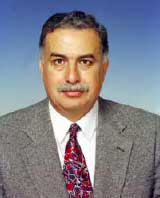Aleppo, Syria
May 9, 2006
 Dr
Margaret Catley-Carlson, Chair,
ICARDA Board of Trustees, formally introduced Dr Mahmoud
Mohamed Bachir El-Solh (photo) as the new Director General to
the guests during the Center’s Annual Presentation Day on 7 May.
The guests included ministers, ambassadors and other senior
officials from the various embassies in Dr
Margaret Catley-Carlson, Chair,
ICARDA Board of Trustees, formally introduced Dr Mahmoud
Mohamed Bachir El-Solh (photo) as the new Director General to
the guests during the Center’s Annual Presentation Day on 7 May.
The guests included ministers, ambassadors and other senior
officials from the various embassies in
Damascus and Aleppo, donor representatives, leaders of national
agricultural research systems, former ICARDA Board chairs and
members, former ICARDA Directors General, and media
representatives. Dr Solh assumed office on 8 May, taking over
from Prof. Dr Adel El-Beltagy, who retired after serving as the
Director General of the Center for more than 11 years.
Welcoming Dr Solh as ICARDA’s new
Director General, Dr Margaret Caltely-Carlson said: “Dr Solh is
no stranger to ICARDA and therefore I hardly need to introduce
him to you. Being a Lebanese, he is the son of the soil, knowing
the ICARDA region and its challenges well. He has been
associated with the international agricultural research and
development in the dry areas since 1972 when he became a staff
member of the Arid Land Agricultural Development (ALAD) Program
in the Near East, the predecessor of ICARDA.”
Dr Solh returns to ICARDA after
serving as Director of Plant Production and Protection Division
at the Food and Agriculture Organization of the United Nations
(FAO) for four years. Prior to that he had served ICARDA with
distinction for nearly 16 years in various capacities – as
Lentil Breeder, Regional Food Legume Breeder in North Africa,
Regional Coordinator of the Nile Valley and Red Sea Regional
Program, and Assistant Director General for International
Cooperation.
Dr Solh holds a Ph.D. in genetics
from the University of California, Davis, USA and has an
impressive record of scientific publications. He has rich
experience in donor relations and fund raising, and an in-depth
knowledge of needs and aspirations of the national agricultural
research and development systems in the Central and West Asia
and North Africa (CWANA) region and beyond.
Addressing the Presentation Day
guests, after his formal introduction by Dr Catley-Carlson, Dr
Solh said, “I would like to thank the ICARDA Board of Trustees
for their highly-valued confidence placed in me to fill this
position. I would also like to express my appreciation to H.E.
Dr Adel Safar, Minister of Agriculture and Agrarian Reform,
Syria for his encouragement and continued support to ICARDA and
to me personally. Through him, I would like to convey my special
thanks to H.E. Dr Bashar Al-Assad, President of Syria, and his
government, for their unwavering support to ICARDA since its
establishment in 1977. I sincerely hope to be up to the
expectations of all stakeholders in meeting the challenges
facing ICARDA to contribute effectively to agricultural research
and provide quality science and technology necessary for the
development of dry areas globally.
“The success of ICARDA in
achieving its noble mission of alleviating poverty and hunger
depends greatly on the support and input of all major
stakeholders. The challenges of agriculture in the harsh
environments of dry areas are diverse, and these could only be
addressed effectively through strategic partnerships.” He then
summarized the priority areas that would receive his immediate
attention, including the finalization of a new strategic plan
that takes into account the changing priorities of agricultural
research in the context of the changes taking place in the
external and internal environment. The ICARDA staff members are
pleased to welcome Dr Solh and his family and look forward to
working under his able leadership.
Established in 1977,
the International Center
for Agricultural Research in the Dry Areas (ICARDA) is one of 15 international centers
supported by the
Consultative Group on International Agricultural Research
(CGIAR). ICARDA serves the entire developing world for the
improvement of barley, lentil, and faba bean; and dry-area
developing countries for the on-farm management of water,
improvement of nutrition and productivity of small ruminants
(sheep and goats), and rehabilitation and management of
rangelands. In the Central and West Asia and North Africa
(CWANA) region, ICARDA is responsible for the improvement of
durum and bread wheats, chickpea, pasture and forage legumes,
and farming systems; and for the protection and
enhancement of the natural resource base of water, land, and
biodiversity.
The CGIAR is a strategic alliance of countries,
international and regional organizations, and private
foundations supporting 15 international research centers that
mobilizes cutting-edge science to promote sustainable
development by reducing hunger and poverty, improving human
nutrition and health, and protecting the environment. |